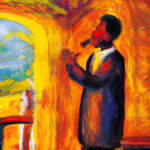In my previous article, with the help of Augustine, I explored the way of repentance as a means of resting in God’s love. I argued that repentance is a powerful weapon in the cosmic battle between our two natures. In this article we’re going to further consider the nature of repentance and its application to daily Christian living.
In his Confessions, Augustine teaches that repentance consists of three elements:
- Recognising the holiness of God
- Confessing the heinousness of our sin in light of that holiness
- Embracing God’s gracious and loving forgiveness.
These three elements will provide us with the headings for this article, as we consider the nature of repentance.
1. God Is Holy
Christians are called to daily behold their holy God. Augustine expressed this holiness, saying that God is “the highest, the most excellent, the most powerful, all-powerful and beyond all-powerful, most merciful and most just, most remote and most present…unmoving but ungraspable, unchangeable but changing everything, never new, never old, but making all things new while leading the arrogant into decrepitude.” What we mean when we say ‘God is holy’ typically falls far short of this glorious vision.
We can only know the immense atrocity of our sins when we appreciate the magnitude of God’s holiness.
In Isaiah 6:3 we hear the heavenly courts declaring: “Holy, holy, holy, is the LORD of hosts; the whole earth is full of his glory.” So, in our daily lives, we must let God’s holiness bear its full weight on our hearts, leading us to confess, without hesitation or qualifications: “Oh LORD, you are holy, and I am not” (1 Peter 1:16; Leviticus 11:44-45). For it is only when we possess an appropriately grand picture of God’s holiness, that we will come to know the heinousness of our sins.
2. We Are Sinful
Beholding the holiness of God, we encounter the wickedness of our hearts. For, as Augustine put it, instead of celebrating the Creator we sinfully delight in what he created (Romans 1:25). Therefore, like King David we can say “I know my transgressions, and my sin is ever before me. Against you, you only, have I sinned and done what is evil in your sight, so that you may be justified in your words and blameless in your judgment” (Psalm 51:3-4). We also know from David’s confession that God does not and will not despise a broken and a contrite heart (Psalm 51:17).
A contrite heart falls at the throne of grace for mercy.
But what does it mean to have a contrite heart, a broken spirit? It is a heart that abhors sin, because it has beheld the holiness of God. It clearly recognises the chasm between us and God, the contrast between his holiness and our sinfulness. A contrite heart falls at the throne of grace for mercy. Listen to Augustine’s words: “My soul’s house is too meagre for you to visit; enlarge it. It is falling down; rebuild it. Inside it are things that would disgust you to see…But who’s going to clean away from me the hidden things that are my own and spare your slave from the hidden things coming from others.” He then added, “I am dust and ashes, but nevertheless let me speak; because here is your mercy to which I am speaking.”
Beloved, with both David and Augustine, we can only know the immense atrocity of our sins when we appreciate the magnitude of God’s holiness. But instead of beating ourselves up, this recognition promotes repentance. Instead of concentrating on our failures, believing that we’re powerless over the sinful nature, we cry out in humility: “LORD, have mercy on me” (Psalm 51:1).
3. The Holy God Forgives Sinful People
Without repentance, restlessness pervades the state of our souls. For the Holy Spirit convicts us of sin, our failure and refusal to glorify God. Augustine noted that the restlessness of our soul thrives in our lack of delighting and glorifying God. Yet in repentance we approach the throne of grace with humble confidence that we will receive grace and forgiveness (1 John 1:9). Rising from our knees in faith, we ask for renewed desires and delight to glorify God (Psalm 51:12).
We’re forgiven sinners, powerfully loved by the righteous and holy God, regardless of our sin.
Beloved, in his love God has made provision for forgiveness through Christ Jesus. Thus when we sin we have the gift of repentance. We can trust God that he has forgiven us. Our restless souls can again be at rest, receiving consolation from God (James 2:13). Thus, the joy of being forgiven comes from embracing and delighting in the reality of what Jesus Christ accomplished on our behalf at the cross (1 Corinthians 15:3-4, 22).
Let us daily embrace this reality by faith. And let us revel in it, knowing that we are forgiven sinners who are powerfully loved by the righteous and holy God, regardless of our failures and sin.
“Let Me Know You the Way I Am Known”
In closing, let your daily plea be the same as Augustine’s. He prayed: “let me know you, you whose business is to know me, to vouch for me and plead for me, let me know you the way I am known.” Beloved, let us pray and resolve to daily grow in our desire to know and behold God in his holiness, so that we might grow in conformity to the image of his Son, Jesus Christ (Romans 8:29). Remember, repentance is a powerful weapon in our fight against sinful desires. Instead of denying our sins, it magnifies them with the lens of God’s holiness. However, it simultaneously rests in God’s grace.













